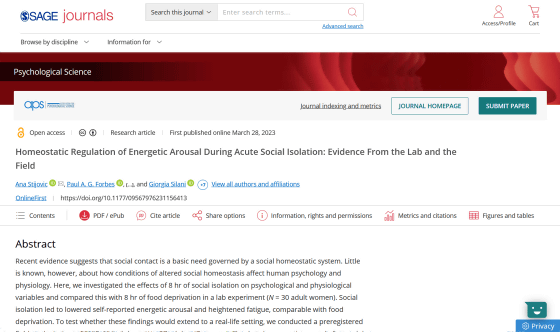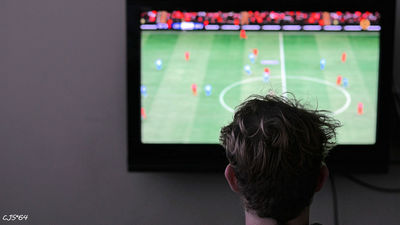Research results that 8 hours of 'loneliness' cause similar energy shortage and fatigue as when skipping meals

Social involvement is important in human life, and it is known from previous research that `` loneliness '' has
Homeostatic Regulation of Energetic Arousal During Acute Social Isolation: Evidence From the Lab and the Field
https://doi.org/10.1177/09567976231156413

Tired of being alone: How social isolation impacts on our energy
https://medienportal.univie.ac.at/en/media/recent-press-releases/detailansicht-en/artikel/tired-of-being-alone-how-social-isolation-impacts-on-our-energy/
8 Hours of Loneliness Can Be as Draining For Some People as Going Without Food : ScienceAlert
https://www.sciencealert.com/8-hours-of-loneliness-can-be-as-draining-for-some-people-as-going-without-food
A research team led by Ana Stijovic, a psychologist at the University of Vienna, investigated the effects of research facilities and the new coronavirus infection (COVID-19) in order to investigate how temporary loneliness affects the body. conducted experiments both at home during the lockdown.
In a laboratory test, 30 female subjects aged 18 to 33 who had not experienced severe loneliness or social isolation in their daily lives were recruited and brought to the research facility over three days. rice field. Each experimental day was assigned to one of ``a day without social contact for 8 hours'', ``a day without food for 8 hours'', or ``a day without both social contact and food for 8 hours''. , Subjects were free to spend their time in a room in the research facility according to their conditions. On ``days without social contact'', access to the Internet and smartphones was prohibited, he could not read magazines with photographs of people, and he had no contact with researchers.
While the subjects spent eight hours in each condition, the research team collected regular feedback from the subjects about stress, mood, and fatigue, as well as heart rate and salivary cortisol levels, which are indicators of stress. I measured diligently.
In addition, in a test conducted at home during the city blockade, 87 subjects living in Austria, Italy, and Germany were asked to report stress and fatigue using smartphones. Reporting was done five times a day, continuously for a week, and it was also investigated whether there was social isolation or social contact on each day.

Analysis of data from experiments conducted in research facilities found that eight hours of social isolation caused the same level of fatigue and energy loss as skipping meals. This result was also supported by data collected during the city blockade.
'Laboratory studies have found striking similarities between social isolation and skipping meals,' the researchers said. Both conditions caused decreased energy and increased fatigue. 'But this is surprising given that skipping meals literally drains you of energy, whereas social isolation does not.'
Also, tests conducted during the lockdown showed that people living alone and those with an inherently sociable personality were most affected by social isolation. These people reported lower energy on days with no social interaction, whereas less social subjects did not show this trend.

Giorgia Silani, a psychologist at the University of Vienna, said: ``The link between long-term loneliness and fatigue is well known, but the direct mechanisms underlying this association are largely unknown. The fact that this effect is seen after a short period of social isolation suggests that the decline in energy is an adaptive response of 'social homeostasis' that may not be able to adapt even in the long term. I am suggesting,' he said.
Science Alert, a scientific media outlet, said, 'The energy loss appears to be the result of an altered homeostatic response of the body, that is, lack of social connection triggers a physical response that balances some sort of balance. 'It can be said that the longer the period of isolation, the greater the potential for damage.'

Related Posts:
in Science, Posted by log1h_ik







